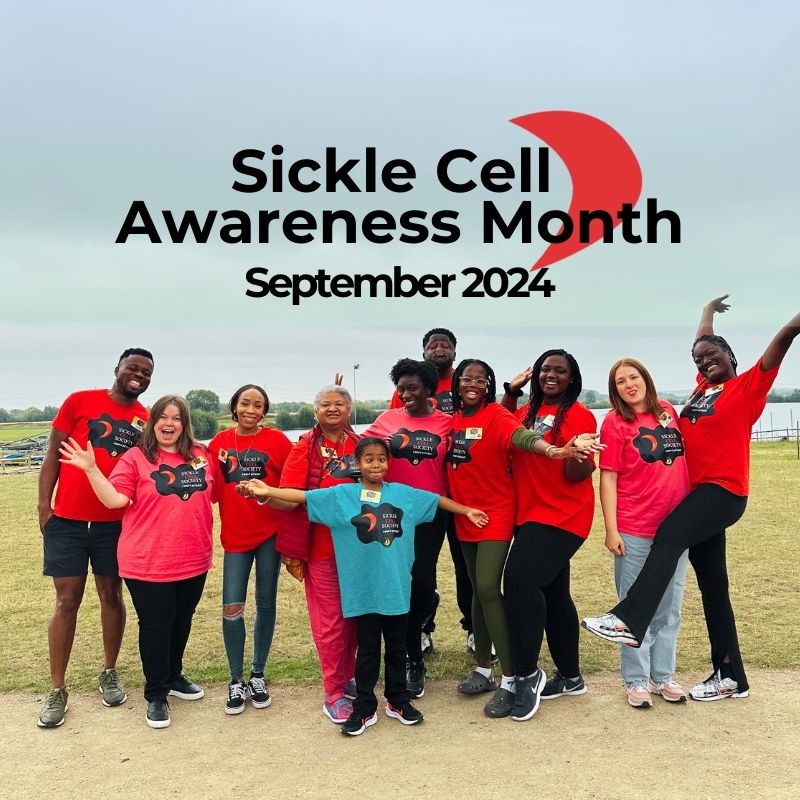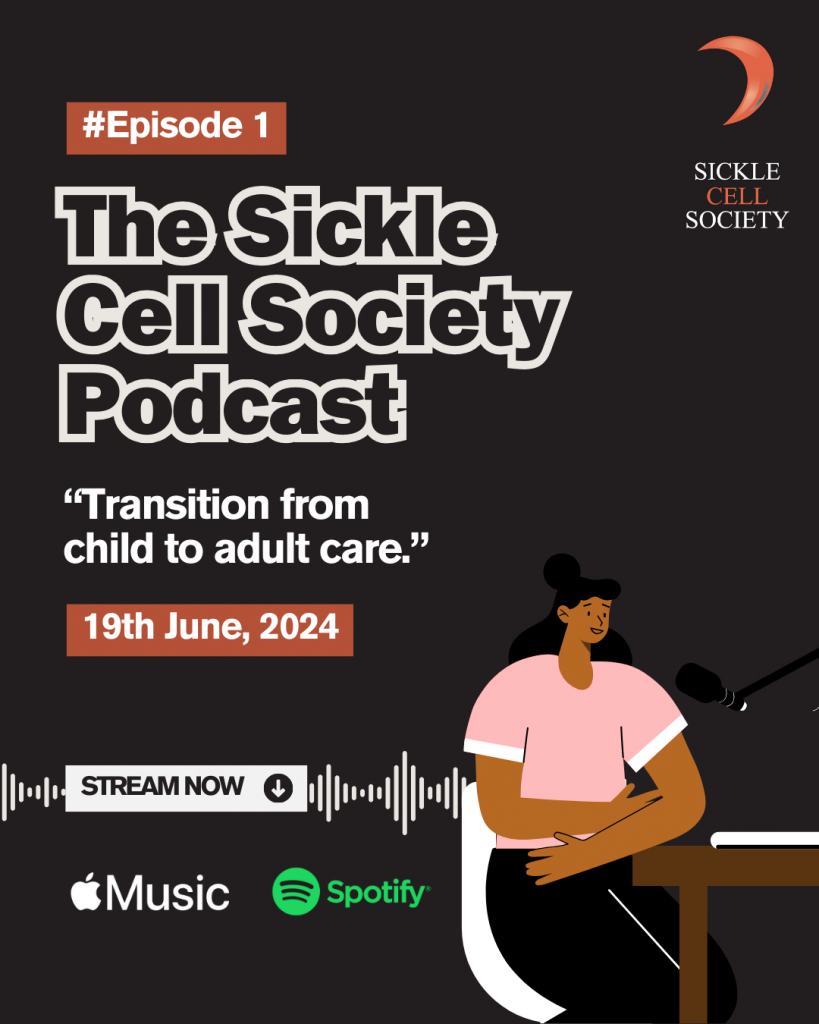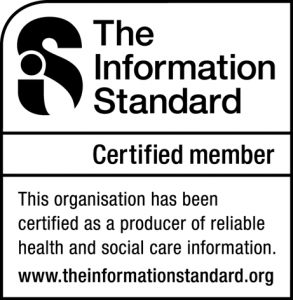Sickle Cell Awareness Month 2024
 September is Sickle Cell Awareness Month, dedicated to raising awareness about sickle cell disorder (SCD) and the challenges faced by people across the World living with the condition. All month we’ll be using our social channels to raise awareness and educate the public on different aspects.
September is Sickle Cell Awareness Month, dedicated to raising awareness about sickle cell disorder (SCD) and the challenges faced by people across the World living with the condition. All month we’ll be using our social channels to raise awareness and educate the public on different aspects.
We’re also championing our collaboration with Netflix and the hit show, Supacell, which has amplified discussions about sickle cell disorder in the UK and across the World.
On this page you’ll find resources to help you to learn more about the condition, find support, and share in your own networks.
Family Retreat 2024
We started the month at Whitemoor Lakes in Staffordshire, at another fantastic Family Retreat, for children who live with sickle cell, and their family.
It was a holistic weekend full of education, adventures, learning and fun. We were supported by a team of enthusiastic volunteers and experienced staff members, and families enjoyed a programme of activities including
educational seminars, climbing, zipwire, archery, peer-to-peer support, relaxation-based activities – and, of course, a Saturday evening disco and Friday night stories around the campfire! All of this was delivered in a medically safe environment designed with children with sickle cell in mind.
Long time friend to the Sickle Cell Society, Miffy, came along for some fun, and our younger guests (and some of the grown up ones too!) really enjoyed meeting her.
During the rest of the month, we’ll be talking about nutrition and sickle cell, mental health and all of the changes taking place in the NHS around sickle cell care.
What is Sickle Cell (SCD)?
Sickle cell disorders are a group of illnesses which affect your red blood cells. Sickle cell is a genetic condition, which means it is passed on from your parents and you are born with it; you cannot catch it from other people.
Sickle cell disorders causes your normally round and flexible blood cells to become stiff and sickle shaped, stopping the blood cells, and the oxygen they carry, from being able to move freely around the body and causing pain. This can cause episodes of severe pain. These painful episodes are referred to as sickle cell crisis. They are treated with strong painkillers such as morphine to control the pain.
People with sickle cell are also at risk of complications stroke, acute chest syndrome, blindness, bone damage and priapism (a persistent, painful erection of the penis).
Over time people with sickle cell can experience damage to organs such as the liver, kidney, lungs, heart and spleen. Death can also result from complications of the disorder. Treatment of sickle cell mostly focuses on preventing and treating complications.
Resources

- Read our specialist sickle cell dietitian blog post here : the role of dietitians blog post
- Download sickle cell information to learn more about the condition, and share it in your networks SC Awareness month 2024 About Sickle Cell Booklet.
- Download Sickle Cell Facts in a quick read SC awareness month 2024 Sickle Cell Facts
- Watch The Sickle Cell Podcast for tips and considerations for the best experience when transitioning from paediatric to adult sickle cell care. The panel includes healthcare professionals ; paediatric and adult consultants, as well as a clinical psychologist, alongside patients. The panel exchange experiences, share insights from their clinical practice and lived experiences, and offered practical tips to help young patients and parents communicate more effectively with their doctors.The full episode page is here The Sickle Cell Podcast You can also watch the video of the episode on our YouTube Channel, or listen here:
5. Watch Supacell if you have Netflix! Use it to start conversations about sickle cell and get more people to understand the condition in real life, and its impacts. Get involved in the online conversations around the show. Rapman has spoken about the feedback he’s received from the sickle cell community and the online comments he’s seen, so your voice is being heard.
6. Encourage friends and family to give blood. Register through our Give Blood Spread Love programme, which encourages people of black heritage to donate much needed blood to support people with sickle cell, and the 250 blood donations per day needed to maintain blood stocks for people living with the condition. Register here : bit.ly/scsgiveblood and follow the project on socials : Instagram – @givebloodspreadlove and Twitter – @givebloodlove . Share our blood donation awareness resources: https://www.sicklecellsociety.org/resource/blooddonation/
7. Come and say hi! All month, the Sickle Cell Society team and our fantastic volunteers will be across the country speaking at events, raising awareness, and getting people to register for blood donation. Come over and say hi! Get involved too, ask questions and sign up to the things you’re interested in.
8. Share your sickle cell awareness month pictures on socials – don’t forget to tag us and use the hashtag #sicklecellawarenessmonth
Interested in fundraising for us?
Sickle Cell Awareness Month is the perfect opportunity to run an event or fundraiser to let people in your community know more about sickle cell and help support those living with the disorder.
We would love to support you in running a fundraising and awareness event. All you need to do is visit our website, fill out the fundraising form and send it to our fundraising team.
The form can be found here: http://www.sicklecellsociety.org/fundraising/
Coming up with ideas can be difficult, so here are a few suggestions:
• Sponsored run, walk, or cycle
• Hold a Come Dine with Me themed evening with your friends
• Organise a quiz night
• Turn £10 into £50 – buy a sponge and bucket to clean 12 of your neighbours cars for £5
Spread the word!
If you are running an awareness and fundraising event or fundraiser, then why not share it with your local newspaper? Local papers love to share what people in their community are doing and it is a great way to raise even more awareness of Sickle Cell Awareness Month.
We are always looking out for people who would be happy to tell their story to hep raise awareness of the issues around sickle cell, treatments and access to care. If you would like to speak to our communications team about us sharing your news on our social media channels or in the media, or supporting us by being an ambassador, please email communications@sicklecellsociety.org
Make a difference
Another great way to celebrate Sickle Cell Awareness Month is to make a difference to those who have sickle cell disorder by donating.
We rely on your kind donations to keep doing the work we do. Every donation allows us to reach more people, run more activities, and improve the lives of those living with sickle cell.
If you’d like to donate visit www.sicklecellsociety.org/donate/







